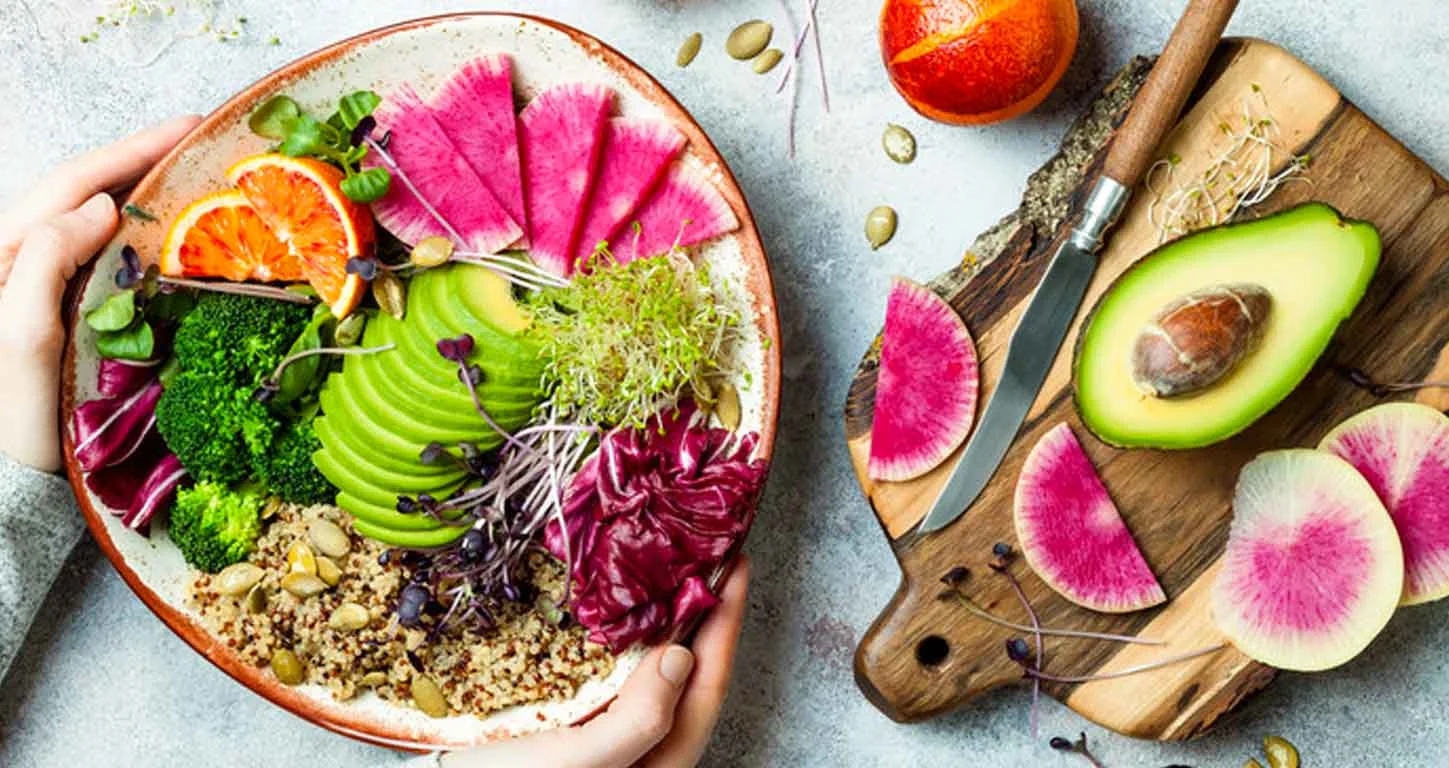Starting a vegan diet can be exciting and rewarding. Here is a simple guide for vegan beginners to help you get started.
What is Veganism?
Veganism is a way of life and a food choice that means not using any animal goods.
It encompasses more than just food choices and often includes avoiding animal-derived products in clothing, cosmetics, and other areas of life.
Here are the key aspects of veganism:
Dietary Choices
- Plant-Based Foods: Vegans eat fruits, vegetables, grains, nuts, seeds, and legumes.
- No Animal Products: This includes meat, fish, dairy, eggs, and honey.
- Alternative Products: Vegans often use plant-based substitutes for common animal products, such as almond milk instead of cow’s milk or tofu instead of meat.
Ethical Considerations
- Animal Rights: Many vegans adopt this lifestyle to prevent animal exploitation and cruelty.
- Environmental Concerns: Veganism is often chosen to reduce one’s ecological footprint, as animal agriculture is a major contributor to environmental issues like deforestation, water use, and greenhouse gas emissions.
Health Aspects
- Nutritional Benefits: A well-planned vegan diet can be rich in essential nutrients, low in saturated fats, and high in fiber.
- Potential Deficiencies: Vegans need to be mindful of nutrients typically found in animal products, such as Vitamin B12, iron, calcium, and omega-3 fatty acids, and may need to use fortified foods or supplements.
Lifestyle Choices
- Cruelty-Free Products: Vegans avoid products tested on animals and those containing animal-derived ingredients like leather, wool, silk, and certain cosmetics.
- Sustainable Living: Many vegans are also interested in broader sustainability practices, such as reducing plastic use, recycling, and supporting ethical brands.
Veganism is a growing movement worldwide, with increasing availability of vegan products and more people becoming aware of its benefits and ethical foundations
Benefits of Going Vegan
Many people choose veganism for health reasons. Heart disease, high blood pressure, and diabetes are less likely to happen if you eat a vegan diet.
It can also help with weight loss. Others choose veganism for environmental reasons, as it reduces the impact on the planet.
Animal welfare is another important reason, as veganism avoids animal cruelty.
Starting Your Vegan Journey
Transitioning to a vegan diet can be easy with the right steps.
Educate Yourself
Learn about vegan nutrition. Make sure you get enough protein, iron, calcium, and vitamin B12. There are many online resources and books to guide you.
Plan Your Meals
Planning helps you stay on track. Create a weekly meal plan and make a shopping list. This makes sure you have everything you need.
Try New Foods
Explore the variety of vegan foods available. You can get a lot of protein from beans, lentils, tofu, and tempeh.
Nuts, seeds, and whole grains are also important. Do not forget to eat lots of fruits and veggies.
Find Vegan Recipes
Look for easy and delicious vegan recipes. There are many cookbooks and websites with vegan meal ideas. Experimenting with new recipes can make your meals exciting.
Start Slow
If going fully vegan seems overwhelming, start slowly. Begin with one vegan meal a day and gradually increase it. This makes the transition easier.
Tips for Staying Vegan
Staying vegan can be easy with some helpful tips. Here are some simple ways to keep on track with your vegan lifestyle:
Plan Your Meals: Make a weekly menu. This helps you know what to eat and ensures you have all the ingredients.
Learn New Recipes: Try new vegan recipes. This makes your meals interesting and stops you from getting bored.
Stock Up on Snacks: Keep healthy vegan snacks at home and work. This prevents you from reaching for non-vegan options.
Read Labels: Always check food labels for animal products. Look out for ingredients like milk, eggs, and honey.
Find Support: Join vegan groups online or in your community. Sharing experiences and tips can be very motivating.
Educate Yourself: Learn about the benefits of veganism. Knowing how it helps animals, the environment, and your health can keep you motivated.
Eat Enough: Make sure you eat enough food. Vegan diets can be lower in calories, so you might need to eat larger portions.
Take Supplements: Consider taking supplements for nutrients like Vitamin B12 and iron. Being healthy and full of energy is helped by this.
Try Vegan Alternatives: Use vegan versions of your favorite foods, like plant-based milk, cheese, and meat substitutes.
Stay Positive: Focus on the positives of being vegan. Don’t be too hard on yourself if you make a mistake. Instead, enjoy your growth.
By following these simple tips, you can enjoy a healthy and happy vegan lifestyle.
Conclusion
Becoming a vegan beginner is a journey. With the right information and support, it can be a rewarding and enjoyable experience. Take it one step at a time and enjoy the benefits of a vegan lifestyle.
